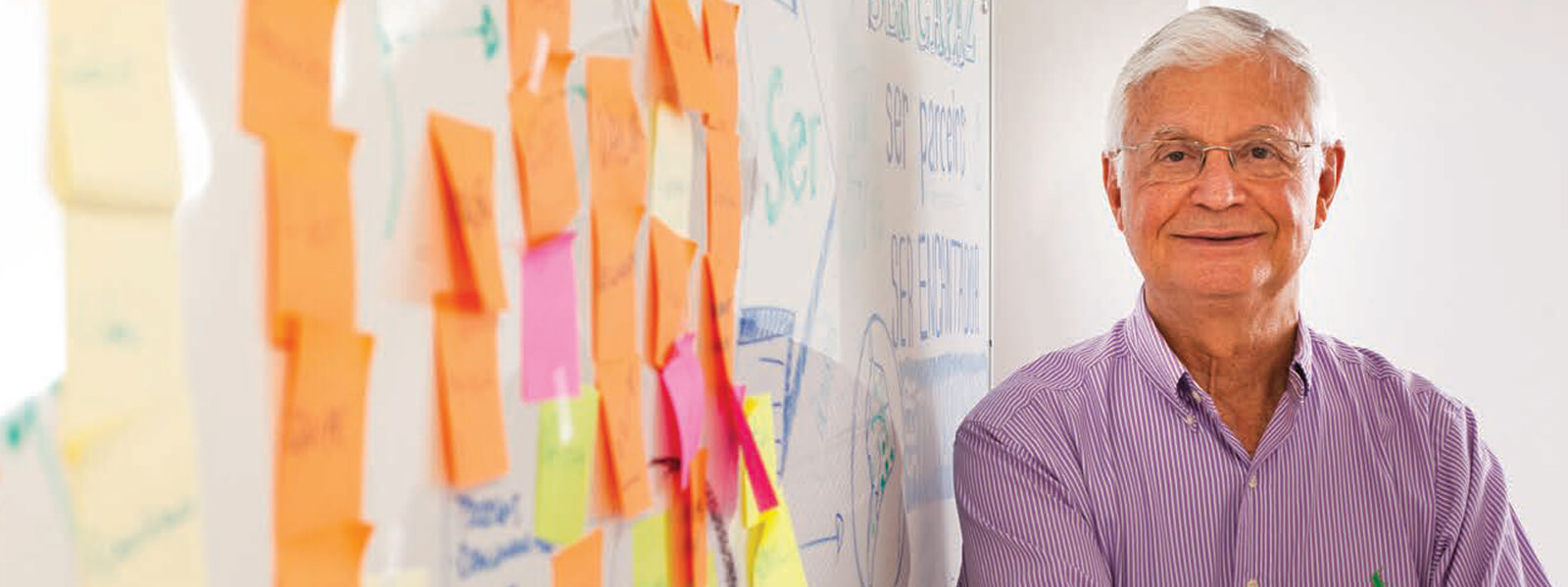Excellence in Management

Get inspired
After 40 years as an executive in the field of finances, Pande’s CEO, Fernando Faria, arrived determined to bring the most modern management techniques to the field of creativity.
“My cachaça are the processes”. To many, it’s difficult to imagine Fernando Faria, Pande’s Chief Executive Officer, speaking that way. But all it takes is asking this soft-spoken man what motivated him to accept, back in 2002, the challenge to manage a creative economy company, after 40 years as an executive in the financial world, to see the passion in his eyes.
In his desk, several folders – all with reports, balance sheets and deadlines. If he wants to know the per-work profit, he reaches for one of them. If the goal is to know how the time of a given employee is allocated, he looks for another one. If he aims to get the exact dimension of each client’s share of the income, he grabs a third one. Faria has reports for everything and with the snippets of information he wants.
In 2002, when he was contacted by Chief Creative Officer Marta Cardoso to take on Pande’s management, there wasn’t an integrated system adapted to the specific needs of a design agency. He could have stuck with the available options, which were insufficient or aimed at other sectors, and tried to adapt them. But no. Faria partnered up with an IT company to give Pande the most complete program in the market.
It was two years in the making. A change here, an addition there, until arriving at the expected result. “I was walking into a new world in which creativity is the focus of the work. I didn’t come from this segment, but I knew perfectly how to structure a company. I went about understanding the processes that were carried out manually and started digitizing them. I started from scratch, integrating each step of the process into a single system”, he tells.
After managing teams of over 500 people, merging companies and acting as the main executive in big corporations, Faria knew how much that information could make a difference in Pande’s trajectory. A good share of agencies, he explains, quote a price and get to working. There’s no control of how much back and forth it will take to finish it. “Not having control of the processes would have kept us in the same place as the majority, without a perspective for growth”. It’s a mistake to think management limits creativity. “Without it, we wouldn’t have half of our creativity”, Faria states.
Before, all of the information was spread across individual spreadsheets. “True administrative madness”, Faria tells. Today, it’s possible to access everything instantly: what’s the income, order statuses, how much is invested, how much is outstanding, expense control, available productive capacity, among other important information for the business management. The CEO gets his iPhone, looks for the data and asks: “We work, on average, with about 200 ongoing projects. Think of how feasible it would be to control it all while ensuring the meeting of agreed deadlines without an integrated management system?”.
INVESTMENTS
For having been a co-creator of the system, the executive could have exclusive rights to acquisition. The IT company actually invited him to become a partner in the project. Instead, he insisted the product was offered to other agencies. He was asked: “Are you going to make it available to others?”. To which Faria answered: “I want you to sell, and I’m even going to help”.
Nowadays over 30 agencies, among the largest in the country, use the same system. Many have visited Pande to better understand how it works and what are its benefits. In those opportunities, the CEO opens the doors to the agency, teaches how to use the system and explains that the program is essential to the business management. But he emphasizes that inputting and using data is always the team’s responsibility.
The gains from releasing the commercialization of the system came in the shape of improvements. Monthly the IT company sends agencies a report based on improvement suggestions and requests from clients, which are promptly included in the program. Those improvements are made available to all, but each one creates their own work parameters.
However, there are two other systems which Faria developed internally, along with the team, which aren’t sold externally. One structures the process between agency and client, registering all orders and changes made until the final delivery of the project, thus avoiding the exchange of emails that may get lost or never arrive.
The other works in prospection, amounting to over 400 registered clients. The fields were created so that any person at Pande can quickly access the entire negotiation history. It’s possible to know who to talk to, which department decides purchases and how many times contact was made, for example. “With that, we prepared the Accounts and New Business department to have a better relationship with the client”.
TRANSPARENCY
How have all of these changes impacted the team? To those with a design background, the saying goes: a work well done is worth more than the time put into it. The executive changed that perspective at Pande by implementing systems and focusing on teamwork. Creativity now walks side-by-side with sustainability and business planning, according to Faria.
That includes, aside from the systems, monthly planning meetings with directors to evaluate results and discuss goals. With these informations and after strategic analysis, there are enough resources for decision making.
Faria’s way of managing impacts even human resource policies at the agency. At Pande, all data is available to the team. “We are living in times where we need to see the employee as a team member. Either he is integrated or the whole thing doesn’t progress”.
Hiding data is inconceivable to the executive. “What’s the point in hiding the numbers from those who help me reach them? Currently, with internet and Google around, the more transparent the relationship is, and the more involved the team and the management are, the greater success you will have”.
PLANS
But since leaving things as they are is not in Faria’s nature, he’s already tracking trends and analyzing the way they can contribute to the business. Remote work is one of them and is connected to the agencies expansion.
Since all the managing systems are online, some of the older professionals at Pande are starting to be allowed to work some days from home. “That’s a nascent project, but we are investing a lot in it. We are preparing to relate to generations Y, Z or any other letter that follows. Another important aspect, which permeates this project, has to do with information secrecy on which we, in fact, are unwavering”, he explains.
There’s little margin for error – all of those at Pande sign confidentiality contracts, receive a welcome kit containing the company’s policies, rules of conduct, benefits, workflow, organigram among other necessary information for the employee’s development and for carrying out the work.
It’s all being laid out so that Pande reaches 2020 as one of the most recognized and respected agencies in the latin american landscape. That’s Fernando Faria’s main goal.



